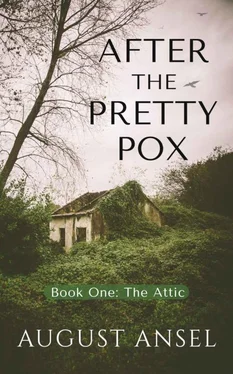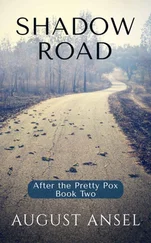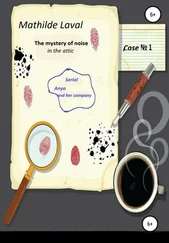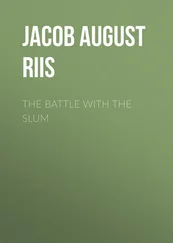“Handy got some more from outside,” she said. She put her slender arm around Arie’s shoulders. It was an intimate gesture, and Arie wanted to shrug her off. That old resistance to touch didn’t mind giving, but it hated to receive. She let Renna’s arm rest where it was. “Are you all right?” she asked again. “What happened?”
“We’re fine, I think,” Arie said. “Something was behind us in the woods, but we didn’t see anything.”
Renna’s eyes widened. “What do you think it was? People?”
Arie patted Renna’s knee. “Let’s get you back over to your bed,” she said. She got to her feet with some effort and helped Renna up. With Arie to steady her on her bad side, she was actually moving pretty well. “I don’t think it was a person,” she said. “Talus, Curran’s dog, she was awfully frightened.”
Renna eased herself onto the car seat, making room for Arie. “Maybe it was a bear,” she said. She’d knotted her long hair behind her head so that wavy tendrils hung down around the sides of her face. Despite her hollow cheeks, Arie thought her remarkably lovely.
“Not a bear,” she said. “Bears won’t come near a dog, especially a big dog like Talus. And they aren’t stealthy. Not this sort of stealthy.”
Then they both heard the click of Talus’s long claws on the hardwood floor below. There was a soft burst of male laughter—two voices—and Renna’s face spread with a smile of simple relief.
“They’re in,” she said, and hugged Arie.
IT WAS NEARLY MIDNIGHT, and Arie didn’t need the windup clock to tell her so. The moon was acting on her like a magnet.
Renna had been asleep for hours. She had taken over the sofa and was rolled in her blanket like a sausage. She hadn’t moved a muscle or made a sound for so long that it was almost as though she wasn’t there at all. This day, which began with a forced march across the attic and was topped off with Curran’s troubling entrance into their world, had exhausted the girl. But Arie also thought that having two men standing guard—Handy on the roof and Curran in the rooms of ruin—had allowed her to drop into a deeper sleep, maybe deeper than any she had had in a very long time.
Everything Arie needed for the ritual was in her pockets or tucked into her belt. She crossed as silently as she could, wanting not to alert Curran down below—though she thought Talus would certainly hear. The sky panel was unbolted; she went up top and carefully closed it behind her to keep a little warmth inside.
“Can’t sleep?” Handy sat in the single corner, bundled much as Renna was. He leaned on the raised platform where the jerry can sat, knife in hand.
“I haven’t aimed for sleep yet,” she said.
After she’d gotten Curran back to the house, Handy had helped him set up a spot to sleep in Arie’s old bedroom. The dog, as delighted with Handy as he had been with Arie, had taken her time sniffing around the house. Arie shooed her in with Curran and told him to keep Talus closed in the room until they could clean up broken glass and anything else that might hurt her. She didn’t need the dog to take an interest in Granny’s closed bedroom door—not yet.
“Everything’s quiet up here,” said Handy. “You should rest, Sister.”
“I have a thing to do,” she said. “You’ll not like it, and I’ll not explain it. I have an errand by the river.”
“Not now,” he said, quiet voice perplexed. “You don’t mean to go out there in the dark.”
“Yes, that’s what I mean.”
He threw off the blanket from around his shoulders and stood. Arie took two steps backward and drew her short spear. “If you try to stop me, all you’ll accomplish is waking everyone else or making me mark you with this blade. And Handy,” she said, her voice conversational, “I’ve bound up enough open flesh in the past few days—I don’t want to make more work for myself with you.”
He sank back to a sitting position and rested his forehead in one hand. “Ariela,” he said. Her name came out in a long, weary sigh. “Something was in those woods tonight. It chased you and him. Right up to the house, damn near.”
Her heart hurt a little to hear the fatigue in his voice. “I’ll tell you a true thing, little brother: there is something in those woods every night. Who knows: tonight may be the night it eats me.” She let down the rope ladder and stepped over the edge of the roof. “Or maybe not. If not, I’ll be back before dawn.”
She took the short spear in hand and moved out of the backyard. Just as she stepped over the buckled sidewalk, she heard Handy overhead.
“I love you,” he said. His words were as clear as if he were standing next to her. He stood at the roof peak, watching her go. His long hair fell around his shoulders, and the moon lit one side of his face; the other half was in black shadow. She lifted her spear in a salute and turned to the trees again, this time strolling to the end of the cul-de-sac, down the hill to the place of ritual.
Those first few steps into the woods were hard to make tonight. Her mind wanted to ping backward and see Talus braced for a fight, snarling at whatever had stalked them from Curran’s camp. But she pushed through it, told herself that it felt like this every month when she had to pick her way along in the dark. The sense of eyes everywhere was part of the ritual, after all—the understanding at a cellular level that tonight each breath could so easily be the last one she pulled into her lungs, that the chorus of frogs and crickets, bats and screech owls might be the music that sang her out of this life.
When she broke through into the clearing, the tall grasses were like a still life—not even the slightest breeze moved them, and in this light they seemed painted there, silvery and still. Somewhere close by—she could no longer tell quite how far—there was a cemetery, the first one established when Eureka was made a town. Most of the headstones had sunk beneath ground level long before Arie had moved in with Granny, and now it was impossible to see even the taller monuments through the landscaping that had gone back to forest and meadow faster than anyone could have imagined possible. The cemetery had never been her intention, though. She was bound for the river, just on the other side of the clearing and down the bank.
She laughed out loud when she got there. It was cold, past dew point, but she didn’t so much as slow down. She set the spear on the stony, leaf-littered bank, stripped out of her clothes, and strode into the river before her skin even registered the cool night air. The cold water made her breath catch, and before she was up to her knees she put her hands over her head and dove.
Gods, the shock of it! All last fall and winter it had been the same, often colder than it was tonight, and every time she wondered if it could be enough to stop her heart. True, winter wasn’t what it once was, and winter here had always been a temperate thing. But when the night air was cold, forty-eight or fifty-degree water was a jolt. She had to fight her lizard brain when it yelled at her to get out, get out, get out of the water now. Instead, she stayed under, kicking for the middle, until finally her breath was gone. Up she came. She broke surface, panting and treading water. It wasn’t very deep out here, perhaps eight or ten feet, but in the dark it seemed there might be a fathom yawning below her fluttering legs, deep enough for any number of mythic creatures to rise up and take her. She forced herself to lie over on her back and float, then she rolled onto her belly and did a neat breast stroke for shore.
Climbing out, the air seemed colder still. Atop her pile of clothes was Curran’s beach towel. Even in the washed-out moonlight, the cartoon starfish was a bright shade of tangerine orange, its huge eyes blue and bordered with long, curling eyelashes. A girl starfish, then. “Appropriate,” she said. The towel was bigger than she was and smelled strongly of Curran’s smoky home in the woods. Arie wrapped herself two whole times around, covered from head to ankles. She let it warm and dry her for a few moments. With the towel over her head, the night sounds were muffled and sweet. At random intervals the water dimpled when some low-flying night critter skimmed the surface and was taken by a fish. Bats were everywhere, small silhouettes. The moon made for a good hunt.
Читать дальше












